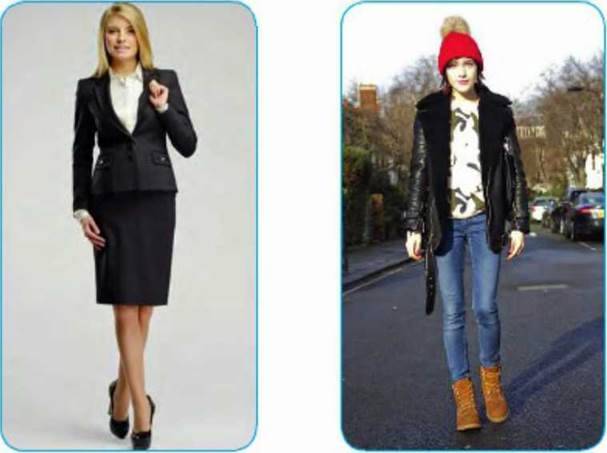Lesson 25
Unit 2 FOOD AND DRINKS CLOTHES
Lesson 25
The Future Simple Tense
Утворення: shall/ will + І форма дієслова
Допоміжні дієслова shall.
1. Make up six sentences using the table.
I You He She We They | Shall (not) Will (not) | Read Live Have Watch Spend | A beautiful carpet on the floor. TV in the evening. In the living room. A lot of time in Kherson. In Kyiv. |
2. Write questions as in the model. In class let your classmate answer them.
Model: Will your father buy a car next year?
1. Your father will buy a car next year. 2. Your cousin will have a large and light room. 3. There will be parking places in your neighbourhood. 4. We shall live in the country in summer. 5. You will wear stylish
3. Read the text. Fill in the chart after it.
Hi! My name is Ann. I like wearing the clothes that I know my mother doesn’t wear. My mum likes wearing quite smart clothes – she works in an office – because she feels better that way. She is often dressed to look as if she has some control over her situation and everything else. At the present moment, she is wearing a suit, and a shirt, and high heels. It’s because she thinks that the image that she is presenting will give people more confidence.
I like to look young and I like wearing bright colours and things that stand out in a crowd like. I like leather trousers and skirts. I like bright colours in my hair as well – like slides and things but also I dye my hair quite often. I don’t see why I should look like everyone else in the street. I like wearing sort of stripey things and spotty things, and bright bouncy things really, and I’m
I also like to wear the sort of things, you know, that I feel comfortable in.
Style of clothes | Reasons | |
1 | 1 | |
Mother | 2 | 2 |
3 | ||
1 bright colours | 1 stand out in a crowd like | |
2 | 2 | |
Daughter | 3 | 3 |
4 | 4 | |
5 |

4. Copy out the things you like and don’t like in Ann’s and her mother’s styles.
Model: Ann’s mother
I like: | I don’t like: |
– smart clothes |
5. Look through your classmate’s notes. Find out what they have in common with yours.
6. Present to class your findings (exercise 5).